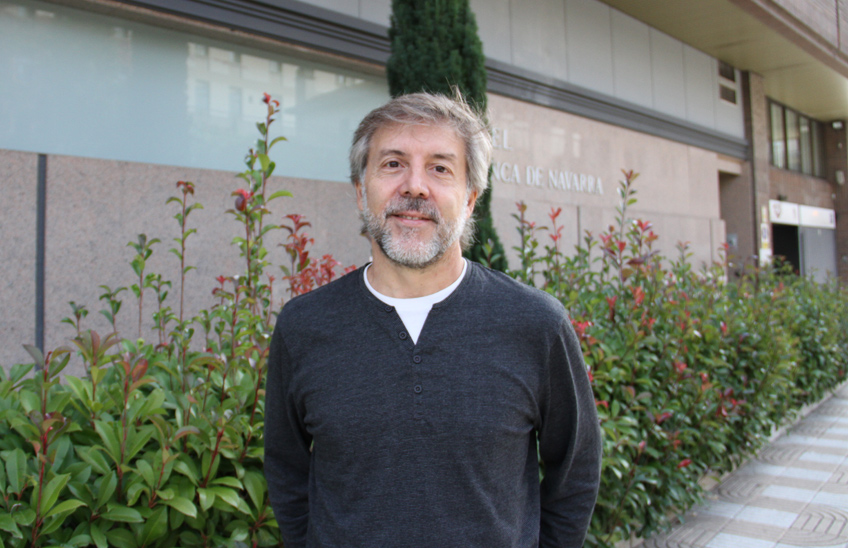Javier Franzé, researcher of UCM: "Colonialism is ending, but not its cultural legacies".
seminar The professor and researcher of Political Theory at the Complutense University of Madrid gave a lecture on postcolonialism at the ICS, within the framework of the challenge ICS 2024-25.

FotoCedida
/Javier Franzé, professor and researcher of the Complutense University, in his visit to the University of Navarra.
08 | 10 | 2024
The traces of the process of decolonization and independence of Latin American nations, which has its roots in the 19th century, are still visible today. So says Javier Franzé, professor and researcher of Political Theory at the Complutense University of Madrid, who shares the vision of the thinkers of the group of programs of study Subaltern who, as opposed to the concept of "colonization", propose the notion of "coloniality".
"They state that colonialism is the strictly political-military element of occupation and withdrawal, while coloniality makes reference letter to the looks, perceptions and classifications of the different groups (white European man, native peoples...). It is the Eurocentric view of the other, a more 'cultural' view, which identifies Europe with civilization," explains the expert. These were some of the issues he addressed at the seminar "Postcolonialism: currents, problems and criticisms", given at the Institute for Culture and Society (ICS) of the University of Navarra, at the framework of the challenge ICS 24-25.
From this perspective, Franzé argues that, at the global level, "decolonization is an infinite task" because "there is a logic of cultural functioning different from the political, economic and military. Colonialism is over, but not its cultural legacies". In this sense, he points out that "a classic problem of the West is to define a being and assign it a fixed characteristic (for example, the prejudices associated with the migrant population of Arab origin). And this task of deconstruction, of revising these assumptions, is never-ending".
Among the examples, quotation the prejudices associated with the migrant population or associating Latin America with populism due to the fact that they are "young and presumably inexperienced peoples". In relation to the latter case, he recalls "the first historical experiences of populism are in the United States, Russia, France and Italy. And, on the other hand, depending on how one interprets it, Argentina, for example, is older than Italy, since it became independent in 1816, and Italy culminated its process of national unification in 1871".
Decolonizing museums?
To advance in this line, he values the work of the group of programs of study Subalternos, which in a certain way, "the anticolonial looks of the 60s and 70s, more centered on the political and the economic. They do not want to repeat the false universalism that they criticize to the colonizing business ". However, he recognizes that, in some issues, "they fall back on a certain essentialism and things are more complex, since the views on reality are constructed". He considers that it is core topic to undertake "a task of revision, not so much to substitute one story for another, but to see different voices on the same fact. I think it is important to show how looks form a world".
For researcher, it is important to "legitimize difference", an issue that "has been incorporated into everyday politics with great force in recent years". However, it poses a problem, "the tension between difference and inequality". Franzé explains that "on the one hand, it is good to recognize the ability of a community that has been made invisible or even persecuted to decide how it wants to live". But, on the other hand, "there is a recognition of communities that have uses and customs that may be unacceptable to us, for example, in the attention to women or in their relationship with nature. Then, a problem arises to the extent that these communities are part of modern states that are based on an idea of understanding human rights, in a democratic state".
The impact of colonization continues to generate controversy and conflicting opinions, such as the current diplomatic crisis between Mexico and Spain or the proposal of the Spanish Ministry of Culture to promote a review of some state museums such as the National Museum of Anthropology or the Museum of America. "It seems interesting to me to review the criteria that organizes museums, but I think it has to be done in political and historical terms, understanding why it has been approached this way, not as a cancellation. Perhaps it can be maintained, showing it in another way, resignifying it, or transforming certain aspects, because the museum is an expression of the society of its time," suggests the expert.
On this issue and so many others that gravitate around the question of decolonization, he stresses the importance of "listening to all voices, not because of a naive pluralism, but because it is very difficult to get out of one's own way of looking at the world. And those of others, even to criticize them, must be taken into account. Although that does not avoid making a decision".




